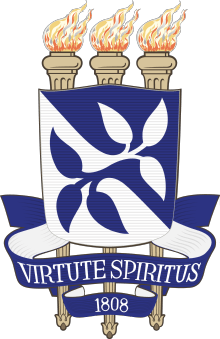Federal University of Bahia
The Federal University of Bahia (Portuguese: Universidade Federal da Bahia, UFBA) is a public university located mainly in the city of Salvador. It is the largest university in the state of Bahia and one of Brazil's most prestigious educational institutions.
Universidade Federal da Bahia | |
 Coat of arms of the university | |
Other names | UFBA |
|---|---|
| Motto | Virtute spiritus |
Motto in English | Virtue of the Spirit |
| Type | Public university |
| Established | April 8, 1946 (oldest course from February 18, 1808) |
| Budget | R$ 1,709,151,955.00 (2016)[1] |
| Rector | João Carlos Salles Pires da Silva[2] |
| Vice rector | Francisco José Gomes Mesquita |
Academic staff | 1,768[3] |
| Students | 27,549[3] |
| Undergraduates | 24,075[3] |
| Postgraduates | 3,474[3] |
Other students | 22,705[3] |
| Location | , , |
| Campus | Urban |
| Colors | Blue and white |
| Sports | Football, basketball, volleyball, handball, capoeira |
| Website | www |
Students can study there without paying tuition fees, as it is a public university. To join the university they must pass an annual examination, known as the "ENEM" (National High School Exam).
History
UFBA was created on April 8, 1946, through Decree-Law 9155. Earlier, the Federal University of Bahia was formed by the School of Medicine and their associated schools, Dentistry and Pharmacy, and the schools of Philosophy, Economics, Law beyond the Polytechnic School. The actual installation of the university took place on July 2, 1946, the oldest center of higher education in the country, the School of Medicine at the Shrine of Jesus.
Four years later, the Federal University of Bahia was federalized. On December 4, 1950, the government enacted the 2234 law setting the Federal System of Higher Education. Since then, the university has been called the Federal University of Bahia. The history of higher education in the state dates back to 1808 when, for determination of the Portuguese court, the first school of medical education in the country was established: the Medical School of Bahia.
This was followed by the Faculty of Pharmacy (1832), School of Fine Arts (1877), School of Law (1891), Polytechnique School (1897), School of Economics (1905), School of Philosophy, Sciences and Letters (1943), School of Librarianship (1942) that formed part of others since 1946.[4]
From that date onwards, new courses were created to meet the scientific and cultural needs of society. The work was coordinated by Edgard Santos, dean of the university from 1946 to 1961.
During this period of activity, the following installations were added: the Central Teaching Hospital, the Schools of Architecture and Education, the School of Music and Scenic art, the School of Geology, the Institutes of Mathematics, Physics, Chemistry, Biology and Health Sciences, the Center for Afro-Oriental Studies and the Museum of Sacred art.[5]
Student life
The university has 57 undergraduate courses, 82 post-graduate courses and more than 100 postgraduate courses. UFBA is one of the first universities in Brazil, having locations throughout the capital of Bahia and one inside, in Vitória da Conquista (south-west).[6]
In 2008, there were three campuses. The candidates per vacancy average was 6.2.[7] The UFBA's Cooperation Agreements has 32 countries (such as the United States, Sweden, Argentina, South Africa, New Zealand, and others).[8]
Notable alumni
- Gilberto Gil, musician
- Milton Santos, geographer
- Wagner Moura, actor
- Ananda Nahu, artist
- Caetano Veloso, musician
- Raul Seixas, musician
- Carlos Marighella, politician
- Jean Wyllys, politician
- Norberto Odebrecht, engineer
- Aliomar Baleeiro, politician
- Jaqueline Goés de Jesus, scientist
See also
- Brazil university rankings
- Universities and higher education in Brazil
Notes
- "UFBA em numeros" (PDF). Retrieved 29 November 2017.
- https://www.ufba.br/conteudo/reitoria
- "Relatório de Administração" (in Portuguese). UFBA. 2010. Archived from the original on 21 March 2010. Retrieved 30 March 2010.
- About UFBA Archived 2009-07-28 at the Wayback Machine
- Historical Information - UFBA Archived 2008-04-24 at the Wayback Machine
- UFBA courses and history
- UFBA statistics (in English, Portuguese, Spanish) Archived 2010-03-21 at the Wayback Machine
- Cooperation Agreements - UFBA Archived 2008-05-27 at the Wayback Machine